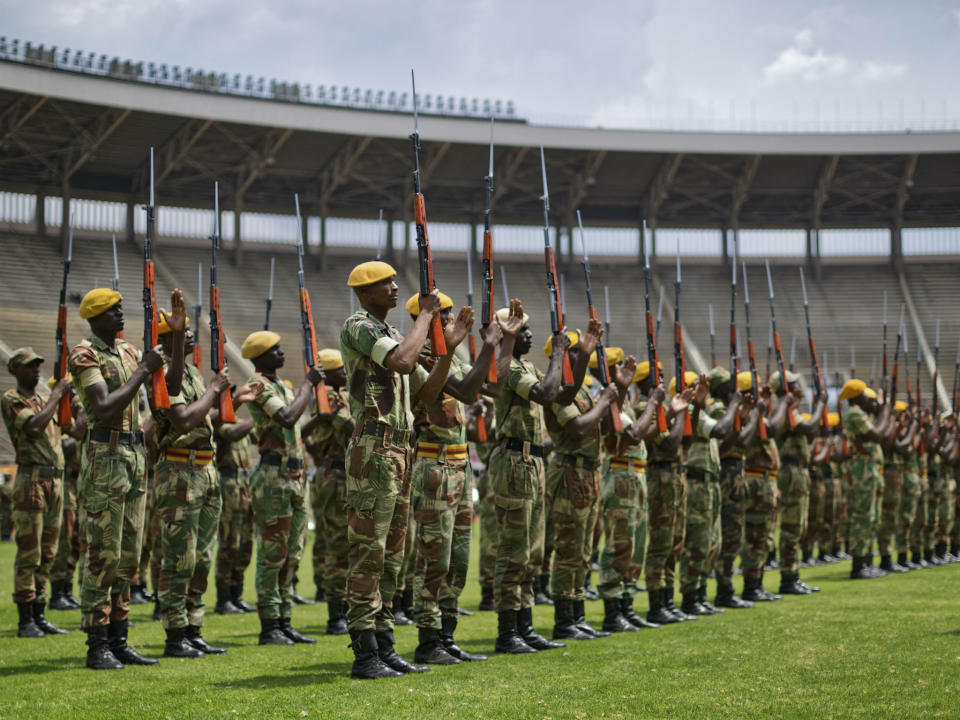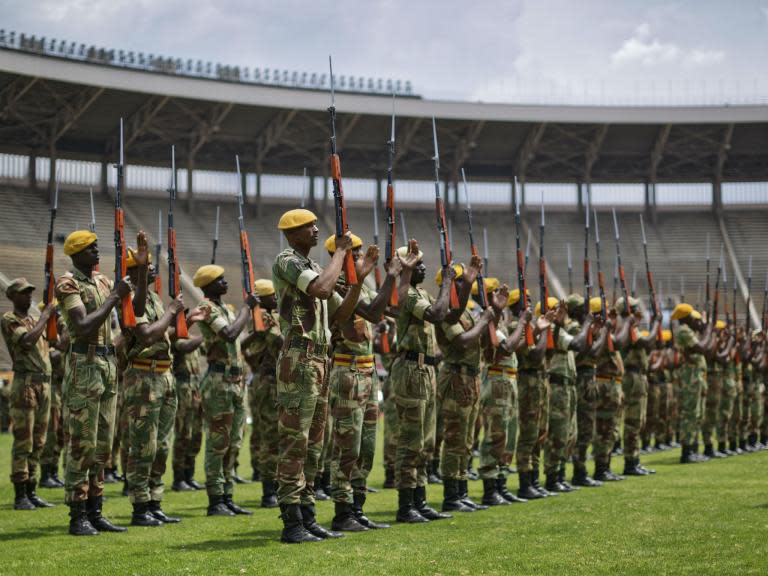Zimbabwe latest: 'Emotional' Mugabe blocked from attending inauguration of man replacing him
A new president has been anointed in Zimbabwe, marking the final landmark break with the reign of Robert Mugabe, one of the most high-profile and controversial figures in international politics and, until his demise, Africa’s longest serving leader.
Senior members of the ruling Zanu-PF party had wanted 93-year-old Mr Mugabe to attend the inauguration of Emmerson Mnangagwa, the man who deposed him, in an attempt to portray a natural transfer of power rather than change at the top initiated by a military coup.
However, Mr Mnangagwa and his allies, it is believed, objected to the proposal vehemently, arguing that it would confer legitimacy to the rule of Mr Mugabe, his wife Grace and their cohorts, who have been accused of abuse of power and corruption.
They also maintained that Mr Mugabe’s presence at the ceremony would be an insult to the hundreds of thousands who have taken to the streets to protest against him and his regime.
One senior official said on the morning of the inauguration: “It was a plan which some people thought would help unify the party, but there were strong views against it which we need to respect and it looks now that it may not happen.
"Anyway, Mr Mugabe needs to rest for a while, it has been a very emotional time for him.”
It was also pointed out that Mr Mugabe’s attendance would have been embarrassing for the new president who, after returning from exile in South Africa, revealed he had been in close touch with the armed forces as the putsch last week was being planned and executed.
“I was in constant contact with service chiefs throughout. I wish to thank the manner in which our defence forces and General (Constantino) Chiwenga have managed this process very peacefully,” he told a crowd at the headquarters of Zanu-PF.
The disagreement over Mr Mugabe and the inauguration came as there was further confirmation that he and his wife Grace, who is accused of abuse and corruption, were granted immunity in return for his resignation.
A Zanu-PF official said the outgoing president was adamant during talks that he did not want to go into exile, that he would die in the land he had helped free from white minority rule.
“It was very emotional for him and he was forceful about it," the official said.
The immunity offer, according to those familiar with the negotiations, was already the table last Sunday when Mr Mugabe was due to resign on national TV. Instead he used his speech to assert that he intended to carry on as president. He finally resigned on Tuesday as parliament began the process for his impeachment and possible prosecution.
The chief whip of Zanu-PF told The Independent on Wednesday that there needs to be a place for Mr Mugabe in Zimbabwean public life. “Now that he has tendered his resignation, he has also saved his face. He is a man who did a lot for his country and needed to rest. He can be an adviser to the party,” said Lovemore Matuke.
“Prosecuting him was never part of the plan,” Mr Matuke told reporters later on Thursday, adding that Mr Mugabe “is safe, his family is safe and his status as a hero of his country is assured”.
Mr Mugabe and his wife Grace will continue to receive protection and he will be entitled to a package which includes a pension, housing, holiday and transport allowance, health insurance, and air travel. It has been suggested that Mr Mugabe may travel to Singapore for medical checks in the weeks ahead, having planned to visit the country before the military put him under house arrest.
It is not known whether Ms Mugabe, who was sacked as Zanu-PF’s women’s leader at the same meeting during which her husband was stripped of leadership, will get the same, or any benefits. There is a groundswell of public anger towards the woman nicknamed “Gucci Grace” and “DisGrace” by her many opponents.
To that end, Mr Mnangagwa issued a statement urging the country’s citizens not to undertake any form of “vengeful retribution”. Some of his supporters have been calling for unspecified action against the "G40" group of party members who backed Mr Mugabe and his wife.
He called the transfer of power the start of a “new and unfolding democracy” for Zimbabwe. The country’s opposition party, the Movement for Democratic Change (MDC-T), released a statement on Thursday morning that it was “cautiously optimistic” that Mr Mnangagwa “will not mimic and replicate the evil, corrupt, decadent and incompetent Mugabe regime”.
Spokesman Obert Gutu said “the electoral playing field should have been completely evened up” with the country scheduled to hold national elections next year.
Mr Gutu said that the opposition party will closely watch Mr Mnangagwa’s next moves, “particularly regarding the dismantling of all the pillars of repression and oppression that had been put in place by the outgoing Mugabe regime”.
However, in a later statement Mr Gutu said the MDC-T had not been invited to Friday’s inauguration and party leader and former prime minister Morgan Tsvangirai has not been invited either.
Mr Gutu said that “it is difficult for us to attend when we have not been invited, so we are still deliberating”. Mr Mnangagwa had lavished praise on Zanu-PF during his address on Wednesday and vowed to make sure “enemies” were dealt with.
Currently, Mr Mnangagwa is still under sanction by the US in response to what Washington has called acts “to undermine Zimbabwe’s democratic processes or institutions” and “acts of violence and other human rights abuses against political opponents” as part of his association with Mr Mugabe.
The international community will also watch the moves of Mr Mnangagwa carefully. Britain’s minister for Africa, Rory Stewart, has arrived in Zimbabwe to meet with political leaders and others from business and civil society groups.
Mr Stewart called the current transition “an absolutely critical moment in Zimbabwe’s history”. He added that “the events of the last few days have given people here real hope that Zimbabwe can be set on a different, more democratic and more prosperous path”.
“What comes next must be driven by Zimbabweans. It must be in line with the Zimbabwean constitution and will be impossible without clear resolve from the incoming government,” he said.

 Yahoo News
Yahoo News 

